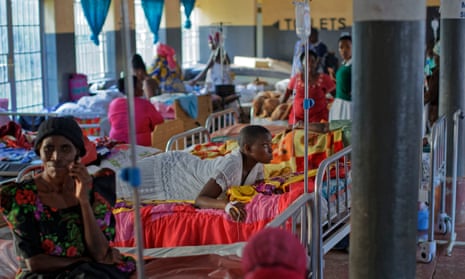Almost 100 million people are pushed into extreme poverty each year because of debts accrued through healthcare expenses.
A report, published by the World Health Organization and the World Bank on Wednesday, found the poorest and most vulnerable people are routinely forced to choose between healthcare and other necessities for their household, including food and education, subsisting on $1.90 (£1.40) a day.
Researchers found that more than 122 million people around the world are forced to live on $3.10 a day, the benchmark for “moderate poverty”, due to healthcare expenditure. Since 2000, this number has increased by 1.5% a year.
A total of 800 million people spend more than 10% of their household budgets on “out-of-pocket” health expenses, defined as costs not covered by insurance. Almost 180 million people spend a quarter or more, a population increasing at a rate of almost 5% per year, with women among those worst affected.
“Only 17% of women in the poorest fifth of households have adequate access to maternal and child health services compared to 74% of women in the richest fifth of households,” said Timothy Evans, senior director of health, nutrition and population at the World Bank Group.
“This remains a problem for not only poor regions of the world, but for all countries at all income levels. At the World Bank, we think that this is both morally and economically bankrupt and unsustainable.
“Universal healthcare coverage is not just about better health. The reality is that as long as millions of people are being impoverished by health expenses, we will not reach our collective sustainable development goal of ending extreme poverty by 2030.”
The WHO and the World Bank want everyone, irrespective of their circumstances, to receive necessary health services without risking financial hardship.
Though universal health coverage is a key target of the UN sustainable development goals, campaigners argue that without a solid commitment from governments this target is out of reach.
“Every country has the resources available to them if they prioritise. This is why we want to see a much greater focus on primary healthcare because it is the poorest who are losing out,” said Oxfam’s health policy adviser, Anna Marriott. “Too much funding is going for tertiary hospitals in urban areas that tend to benefit the better off more than the poor, and yet rural areas are neglected, with people left to fend for themselves.
“We absolutely need a commitment to address inequality in health. You are almost four times as likely to get the essential package of healthcare if you are rich.”
According to the report, Asia has the highest rate globally of those pushed below the poverty line due to out-of-pocket health costs. An estimated 72% of those spending 25% of their household budgets on healthcare live in Asia.
Africa has seen the fastest increase in the numbers of people who spent at least 10% of their budgets on healthcare.
The problem of healthcare affordability is not limited to developing countries. In Europe, Latin America and parts of Asia, each of which have high levels of access to health services, increasing numbers of people are spending at least 10% of their household budgets on health expenses.

Comments (…)
Sign in or create your Guardian account to join the discussion